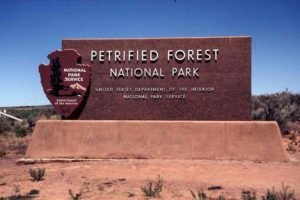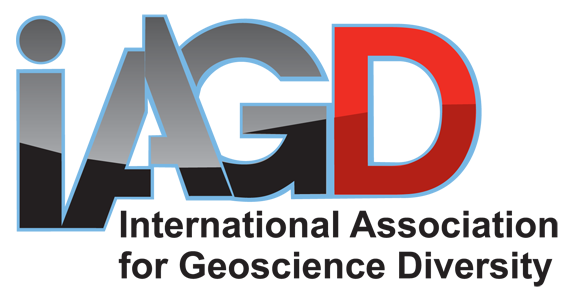Field Trip 19: Accessible Field Geology of Petrified Forest National Park
Wednesday and Thursday, September 25-26, 2019
Departs from the Phoenix Convention Center, Phoenix, Arizona, USA
This fully accessible field trip (#19) will span two days at the conclusion of the Geological Society of America (GSA) Annual Meeting in Phoenix, Arizona, USA.
We are no longer accepting applications for participation. Notification of acceptances will be sent prior to August 19, which is the deadline to apply for GSA’s travel grants and an early registration discount.
This field trip is open to post-secondary students, geoscience faculty, and industry practitioners. PREFERENCE WILL BE GIVEN TO THOSE WITH DISABILITIES. To insure that people with disabilities are given first priority, everyone must complete the application form. If you are accepted to participate, you must make arrangements to arrive at the Phoenix Convention Center no later than 11:00 a.m. on Wednesday, September 25th, and depart no sooner than 12:01 am, Friday, September 27th. Conference registration, transportation to Phoenix and lodging at the Annual Meeting are at your own expense. Field-trip registration and all related trip expenses, including overnight lodging during the trip (Wednesday in Holbrook and Thursday at the Phoenix Sky Harbor Airport) will be covered. IAGD student travel grants will also be available.
Field Trip Itinerary (posted 5/5/2019)
2019 Accessible Field Trip Guide:
Atchison, C.L., Parker, W.G., Riggs, N.R., Semken, S., and Whitmeyer, S.J. (2019). Accessibility and inclusion in the field: A field guide for central Arizona and Petrified Forest National Park, In Pearthree, P.A., ed., GSA 2019 Phoenix Field Guides: Geological Society of America Field Guide 55, 1–23, DOI: 10.1130/2019.0055(02).
Field Trip Description:
This field trip will visit key localities of Mesozoic strata in the Petrified Forest National Park (PEFO) region with the goal of expanding approaches to providing inclusive, field-based learning experiences for students with disabilities. En route from Phoenix to PEFO, the trip will make several brief stops to review the geology of the Transition Zone, Mogollon Rim, and Colorado Plateau. Trip leaders will place a strong emphasis on active learning and collaboration as participants consider their surroundings and make inferences about the geologic processes that have shaped, and continue to shape each location. Modern technologies, such as mobile devices, will be used to interpret the geology and facilitate communication and interaction among participants.
This trip is designed to enable students with disabilities to build on their interest in the environment and to promote the geosciences as a viable degree and career option. Additionally, this trip is open to geoscience faculty with disabilities, enabling them to remain actively engaged in their discipline and sharing their knowledge and experience with the next generation of geoscience practitioners. If space permits, geoscience students and faculty without disabilities will be invited to participate to learn strategies of inclusion and accommodation first-hand from the students and field trip leaders. Participants with disabilities will then be paired with non-disabled participants to collaborate on typical tasks that often present barriers in geoscience field trips and field courses.
This field trip has three primary objectives: (1) to provide a fully inclusive field-based learning experience for students and faculty across a variety of disabilities (e.g. orthopedic/mobility, deaf/hard-of-hearing, blind/low-vision, developmental, cognitive); (2) to provide a unique training opportunity for geoscience faculty learning how to accommodate students with disabilities in geoscience field courses; and (3) to extend the network of people and resources developed from previous accessible field trips, courses and research projects. These objectives will drive the collaborative nature of this inclusive and accessible two-day field trip where participants will work with and learn from the diverse perspectives and experiences of everyone involved.
Sponsors:
- The International Association for Geoscience Diversity
- GSA Geoscience Education Division
- GSA Diversity Committee
Financial Support Provided By:
- National Science Foundation, Award 1540652
- The International Association for Geoscience Diversity
- GSA On to the Future
Trip Leaders:
Christopher Atchison is an associate professor of geoscience education at the University of Cincinnati. His research focuses on enhancing access and inclusion in the Earth sciences through opportunities designed to accommodate students, faculty, and geoscience practitioners with physical, sensory, and developmental disabilities. He leads accessible field trips and instructional development workshops for creating inclusive communities of learning in classroom, laboratory, and field courses. He is a Past-Chair of the GSA Geoscience Education Division and Executive Director of the International Association for Geoscience Diversity (IAGD).
Field Trip Experience:
- 2018 Co-Leader: 403: Accessible Cave and Karst Geology of the Mammoth Cave National Park Region
- 2017 Co-Leader: 414: Accessible Field Geology of Western Washington, Seattle, WA
- 2017 Co-PI: Accessible Field Course in Western Ireland (NSF #1540652)
- 2016 Co-Leader: 417: An Accessible Journey through Geologic Time in Central Colorado, Denver, CO
- 2016 Co-PI: Accessible Field Course in Northern Arizona (NSF #1540652)
- 2014 Co-Leader: 416: Full Access to the Geology of the Sea-to-Sky Highway, Vancouver, BC
- 2010 Dissertation Study: https://theiagd.org/access-able-wright-state-university-students-experience-mammoth-cave-national-park/
Nancy Riggs is a professor of volcanology and tectonics at Northern Arizona University. She has published several papers on the age and provenance of the Chinle Formation and equivalent strata off the Colorado Plateau. She has taught field camp and field-methods courses through most of her career, and has led field trips for high school students to PEFO. Riggs is a Fellow of the Geological Society of America.
Steven Semken is professor of geology and education in the School of Earth and Space Exploration at Arizona State University who has resided, worked, taught, and led field trips in the American Southwest for more than 30 years. Steve is an ethnogeologist and education researcher who studies how place and culture influence the ways we study and teach geoscience. He taught at the Navajo Nation tribal college for 15 years before joining ASU in 2003. Steve and his students focus on the geologically and culturally diverse places of the Southwest and Latin America, applying place-based teaching to foster access and diversity in the geoscience community, environmental and cultural sustainability, and greater public Earth-science literacy. Semken is a Fellow of the Geological Society of America and a Past-President of the National Association of Geoscience Teachers.
Recent Field Trip Experience:
- 2018 Co-Leader: “GSA GeoTeachers Colorado Plateau Field Workshop” (which included PEFO).
- 2015 Trip Leader: “AGI-ASU-NASA Triad Teacher Professional Development Field Workshop” (which included PEFO).
- 2013 Co-Leader and Guidebook Co-Editor: “New Mexico Geological Society Route 66 Region Annual Field Conference” (which included PEFO). Guidebook won the 2016 Best Guidebook National Award from the Geoscience Information Society.
- 2013 Co-Leader and Co-designer, “Grand Canyon Immersive Virtual Field Trip,” http://vft.asu.edu.
- Leads annual geological field trips to PEFO for ASU students in Historical Geology and Southwest Regional Geology courses.
Steven Whitmeyer is professor of structural geology, tectonics, and geospatial technologies in the Geology and Environmental Science department at James Madison University. His research focuses on the use of digital field mapping and geospatial information to address regional problems with global tectonic implications. He has also worked to incorporate digital technologies in various aspects of geoscience education. He was director of the JMU Geology Field Course in Ireland for many years, and was formerly PI of the NSF-funded “Engaging Students in Inclusive Geoscience Field Experiences via Onsite-Remote Partnerships” project. Whitmeyer is a fellow of the Geological Society of America.
Recent Field Trip Experience:
- 2017 Co-Leader: “Accessible Field Geology of Western Washington”; GSA, Seattle, WA
- 2015 Co-Leader: “A Billion Years of Deformation in the Central Appalachians: Orogenic Processes and Products”; GSA, Baltimore, MD
- 2013: Co-Leader: Pre-Conference Field Trip, GeoHazards Impacting Transportation in Appalachia & ITGAUM Joint Forum, Harrisonburg, VA
- 2012: Co-Leader: “Geology of Page Valley: Stratigraphy, Structure, and Landscape
- Evolution”; Virginia Geological Field Conference, Harrisonburg, VA
- 2012: Co-Leader: “The Valley & Ridge to Blue Ridge Province Transition in Northern Virginia”; EarthScope Interpretive Workshop, Harrisonburg, VA
Bill Parker is the Chief of Science and Resource Management at Petrified Forest Arizona. He has a MS degree in geology from Northern Arizona University and a PhD in geology from the University of Texas at Austin. Bill is a vertebrate paleontologist by training and specializes in the paleontology, stratigraphy, and biostratigraphy of Triassic rocks in the southwestern United States.


